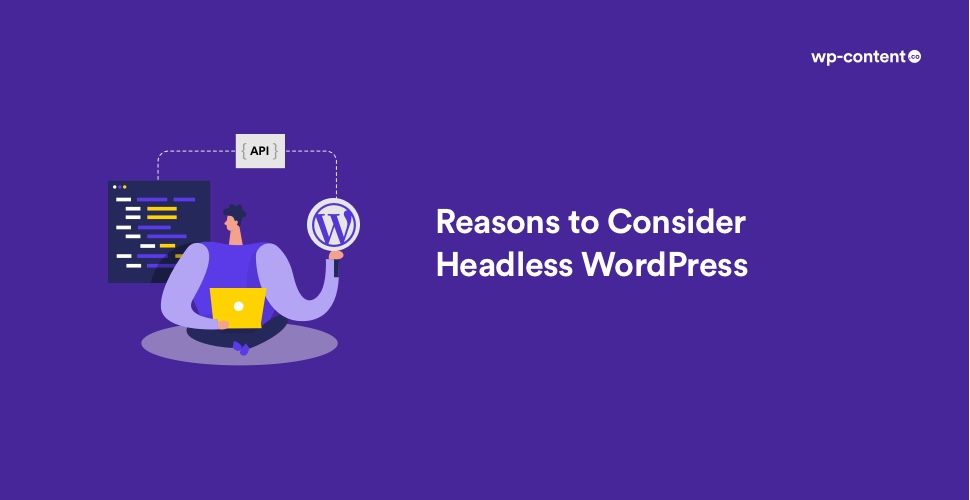While traditional WordPress is still very much a relevant CMS, headless WordPress is changing the game completely. With its multiple benefits, headless WordPress would soon become the next big thing in the web development world. Here are some of the reasons why you should totally consider headless WordPress for your website.
Before we get into the topic, let’s first see what headless CMS and headless WordPress are.
Defining Headless CMS
While traditional CMS couples front-end (presentation layer) and back-end (content database), headless CMS is a content management system where both are decoupled. The headless CMS separates content production, management and storage from distribution and display. That is, headless CMS facilitates creating and storing content while excluding publishing and display of the content. The system in turn uses API or SDK for the display of the content, and you can choose any that you wish to facilitate.
What is Headless WordPress?
In a headless WordPress, the site uses WordPress to manage the content while any other custom frontend stack is used to actually display that content to a site visitor. One of the prime advantages of headless WordPress is that it decouples content editing teams and developers. This means the content and marketing teams can utilize the WordPress interface that they are familiar with and the development team can use the tools that they like – React, GraphQL or anything they prefer.
Now that you have a brief overview of headless CMS and headless WordPress, let’s see the benefits of the latter.
1. Easier Multi-channel Publishing
One of the main uses of headless WordPress is it facilitates multi-channel publishing. Basically, you can post one thing and it will be published on multiple platforms – websites, apps and social media accounts. This is done with the decoupling of the front-end and back-end and the availability of API. This means you can freely create a website without the constraints of PHP. You can even choose not to have a website and just a hub to manage the content and it would work just fine.
2. Compatible with Any Language
Just like how API facilitates multi-channel publishing, it can also be used to connect to any front-end. While the traditional WordPress uses languages such as PHP, Javascript, CSS and HTML, you can make use of the possibilities of other languages available, with headless WordPress. All you need to do is properly configure the headless WordPress and it will work smoothly, just like WordPress.
3. Greater Control
From a development standpoint, you gain endless control when you decouple WordPress. You could be a content publisher or a front-end developer, headless WordPress gives you full control over the visualization of the content. While the publishers gain greater control over the presentation of the content, front-end developers can use different technologies to deliver a greater experience to the users.
4. Better and Faster Performance
WordPress websites powered by other front-end are quite smooth and responsive. Headless WordPress when compared to traditional WordPress is way too fast and loads lightning fast. This is because it loads only the necessary files through API calls. This is however true for static websites as it needs to load only simple HTML and the pages would appear almost instantly.
5. Lightweight Design
Since the system is made of just a content database and API calls, the system sheds some weight and performs better. This leads to lesser complication of future redesigns and you can easily redesign your website within a fraction of the time usually taken.
6. Extra Layer of Security
Headless WordPress comes with an extra layer of security. You are basically setting up a server that is hidden and quite hard to find. Headless WordPress does not have a login screen at the front-end server and is connected to your sites and apps through API. With this, hackers find it difficult to force into your site. Your front-end and backend would be running on different servers, so attacking the source of your content is close to impossible. Even if they attack your front-facing site, since you are using multichannel publishing, every other platform remains unaffected.
You get better protection if you have more layers to your site, and that’s exactly what headless WordPress offers. Also, since headless WordPress is a relatively new technology, hackers will take time to learn about breaking into it.
7. Unmatched Flexibility
Various front-end options allow you to integrate WordPress content into complex, organization-wide websites. This means you can combine WordPress content with content from other CMSs and web services!
8. Future-Proof Tech Stack
Even if a specific technology becomes outdated, you can easily switch to another in headless WordPress as it can integrate with any platform. Upgrading to the latest technologies is quite easy and your tech stack remains future-proof as this system is API-driven. It also gives you an edge over your competitors as it can support all the popular cutting-edge technologies such as VR, AR and IoT.
9. Better Scalability
A headless WordPress has better scalability than a traditional one. Since the back-end and front-end are separated, there would be no need for downtime for the maintenance of the site. So, you can redesign, upgrade and customize your site without re-implementing the CMS and compromising the site’s performance. When you develop with a headless system, you can scale it up very quickly.
10. Developers Would Prefer Going Headless
Since it gives great control and freedom, the chances of developers opting for headless WordPress is higher. It allows them to customize a site without affecting the front end. If they want to show what they have developed to the audience, all they need to do is just link the back-end and front-end with the API.
Wrapping Up
Monolithic WordPress sure is one of the best CMS out there, but headless WordPress is more functional. It does have drawbacks as well, but considering its sustainability and scalability, it is one of the best CMS you could adopt for your website. Let us know in the comment section what you feel about the new technology.


